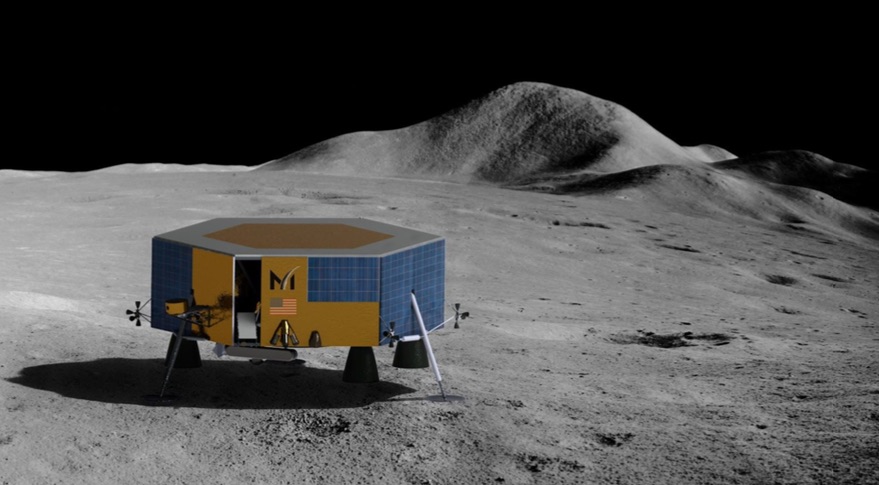Products You May Like
WASHINGTON — NASA has made awards to four companies worth exactly $25,001 to obtain lunar samples, part of an effort by the agency to establish a precedent for ownership and use of space resources.
NASA announced Dec. 3 that it issued awards to ispace Europe, ispace Japan, Lunar Outpost and Masten Space System for the collection of small amounts of lunar samples. The companies will be responsible for flying missions to the moon and demonstrating that they have collected the material through images and other data. NASA will then take ownership of the materials.
The agency announced the initiative in September, emphasizing that the awards are less about the samples themselves than about being able to extract and use lunar resources. “What we’re trying to do is make sure that there is a norm of behavior that says that resources can be extracted and that we’re doing it in a way that is in compliance with the Outer Space Treaty,” NASA Administrator Jim Bridenstine said in a Sept. 10 speech.
NASA officials reiterated that point in a call with reporters about the awards. “We want to demonstrate explicitly that you can extract and you can utilize resources, and that we will be conducting those activities in full compliance with the Outer Space Treaty,” said Mike Gold, acting associate administrator for international and interagency relations. “That’s the precedent that’s important to set.”
NASA received 22 proposals. Phil McAlister, director of commercial spaceflight at NASA Headquarters, said the agency used a “lowest price technically acceptable” approach to evaluate the proposals, first determining whether or not the proposal was feasible and met the agency’s requirements. He said 14 of the 22 proposals were rejected either for technical issues or costs that went over the agency’s limit.
NASA then selected proposals starting with the least expensive, continuing until it reached its budget. That meant NASA selected one proposal, by Colorado-based Lunar Outpost, which offered to sell NASA lunar material for $1.
“Lunar Outpost chose to bid $1 as a token amount,” Justin Cyrus, chief executive of Lunar Outpost, told SpaceNews. “Bidding at $1 was meant to show this contract as Lunar Outpost’s contribution to the field of space resources to enable the establishment of a legal and procedural framework.”
Lunar Outpost is developing a rover called MAPP that it will fly to the moon on another company’s lander. While NASA said that Lunar Outpost will fly on Blue Origin’s Blue Moon lander to the south pole of the moon in 2023, Cyrus said his company is also in discussions with Intuitive Machines, Lockheed Martin and Masten about flying on those companies’ lunar landers. That mission, he said, will be paid for by flying payloads on the rover from other, unnamed customers.
Japanese lunar lander developer ispace received $5,000 awards for both its Japanese and European business units for separate lunar lander missions, one to Lacus Somniorum in 2022 and the other to the south pole in 2023.
“For ispace, this collaboration with NASA in two regions where we operate shows the positive momentum for our development as an internationally operating company,” Takeshi Hakamada, chief executive of ispace, said in a statement. “For the space industry, as well as the potential for all industries on Earth, this marks the beginning of a cislunar economy where economic value can be created on the Moon, apart from Earth — but for the benefit of Earth’s economy.”
Masten Space Systems received the largest award, $15,000, for a mission to the lunar south pole in 2023. The company won a Commercial Lunar Payload Services (CLPS) contract from NASA earlier this year for a lander mission that will carry nine science and technology payloads.
“In case there is any doubt: the lasting impact of today’s news that NASA is purchasing Moon dirt from Masten is about knocking down uncertainty and risks that make economic activity beyond Earth too risky to act upon,” the company tweeted. “Today’s Lunar Regolith Purchase is small measured in dollars, but monumental measured in impact on unlocking the value of space for humanity.”
The two ispace companies were among four from outside the United States that submitted proposals. “We actually saw an advantage of other countries coming in to this activity,” McAlister said, by bolstering broader policy goals. Luxembourg, where ispace Europe is headquartered, has a law that grants companies rights to space resources they extract, based on one the U.S. enacted in 2015. Japan is considering similar legislation.
NASA hasn’t made plans for how it will collect or use any samples those companies collect. “While a lot will depend upon where initial human exploration activities will occur, there is certainly a strong possibility, particularly for the activities that are occurring in the south pole, that we will indeed be able to collect the samples for analysis,” Gold said.
The awards are arranged such that NASA pays the companies 10% at the time of award, another 10% at launch and the remaining 80% once the sample is collected. That structure is valid even for Lunar Outpost’s $1 award. “Is NASA going to cut a check for 10 cents? The answer is yes,” McAlister said. “Yes, the postage is going to be more than the check, which is kind of amazing.”
